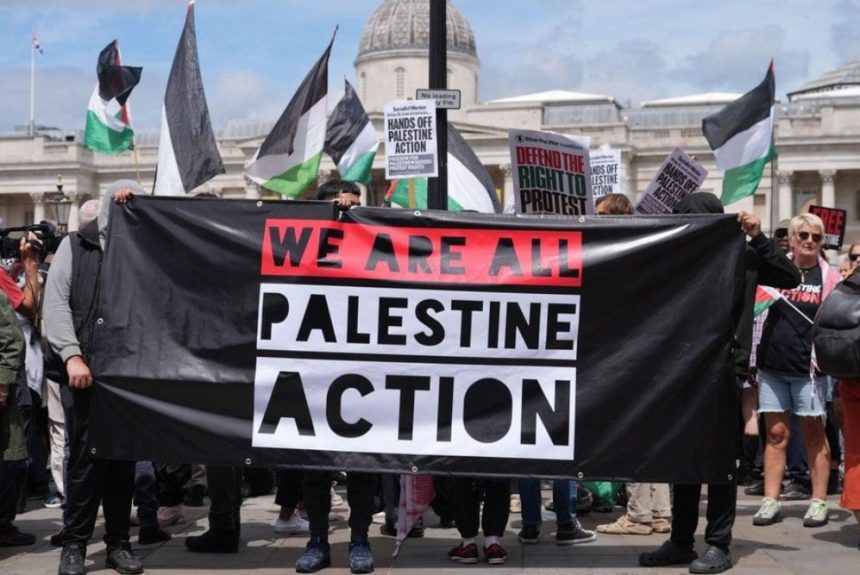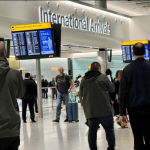A High Court judge has refused to halt the UK Government’s plan to officially ban the activist group Palestine Action, clearing the way for the proscription to come into force this weekend.
The group, known for its direct action protests, will become a proscribed terrorist organisation from midnight on Saturday. The move follows a rejected legal bid by Palestine Action to temporarily block the legislation.
Mr Justice Chamberlain dismissed the application for an “interim relief” order, which would have paused the ban. The judge ruled that the home secretary’s decision was backed by Parliament and was not for the court to assess in terms of political wisdom.
“The order, which the home secretary considered to be ‘required in the public interest’, was affirmed by both Houses of Parliament,” Mr Justice Chamberlain said.
He accepted that the ban would have “severe effects” on the group and others involved but made it clear the court’s job was not to question the political judgement behind the decision.
The judge called it “ambitious” for Palestine Action to argue it had no links to terrorism, especially in light of the group’s recent action at an RAF site.
The proscription was announced shortly after a high-profile incident at RAF Brize Norton in Oxfordshire, where two Voyager aircraft were damaged on 20 June. The estimated cost of the damage stands at £7 million, though Palestine Action supporters dispute the figure and claim one of the planes has already returned to service.
As the court session unfolded on Friday, crowds gathered outside the Royal Courts of Justice. Palestinian flags were waved, and banners reading “Free Palestine” and “We are all Palestine Action” were held high.
Following the ruling, Palestine Action’s co-founder, Huda Ammori, said the public was being kept “in the dark about their rights to free speech.”
Her legal team swiftly took the fight to the Court of Appeal, but judges there also turned down the request to block the ban. The decision was handed down just after 10.30pm.
Lady Chief Justice Baroness Carr remarked, “The judge was entitled to take the view that the harm identified… would be the product of an individual’s decision not to comply with the order.” She added, “There is no real prospect of a successful appeal.”
Raza Husain KC, representing Ms Ammori, attempted to escalate the case to the Supreme Court, arguing it involved a matter of “general public importance.” But Baroness Carr told him directly, “You are not going to get to the Supreme Court before midnight.”
The Court of Appeal also declined to pause the ban while further appeals were considered. Any additional applications must now be submitted by 4pm on Monday.
Earlier, in the High Court, Mr Husain argued, “This is the first time in our history that a direct action civil disobedience group, which does not advocate for violence, has been sought to be proscribed as terrorists.”
He said Ms Ammori was driven by the UK’s long-standing tradition of civil disobedience and aimed to prevent harm rather than cause it.
Quoting Ms Ammori, he added that the group had “never encouraged harm to any person at all” and that their mission was “to put ourselves in the way of the military machine.”
Ms Ammori had asked for the proscription to be put on hold until 21 July, when a broader legal challenge is scheduled to be heard.
“The secretary of state has still not sufficiently articulated or evidenced a national security reason that proscription should be brought into effect now,” she said.
Ben Watson KC, speaking for the Home Office, argued strongly against any delay. He called the request to pause the ban an “insuperable hurdle” and warned that such a block would cause a “serious disfigurement of the statutory regime.”
A separate hearing later this month will decide whether Ms Ammori’s wider challenge against the government’s decision can proceed.
The Home Secretary, Yvette Cooper, previously described the RAF aircraft damage as “disgraceful.” She pointed to Palestine Action’s “long history of unacceptable criminal damage” when announcing plans for the ban.
MPs overwhelmingly backed the move in the Commons on Wednesday, voting 385 to 26 in favour. The following day, the House of Lords supported the decision without requiring a formal vote.
Four individuals – Amy Gardiner-Gibson, 29, Jony Cink, 24, Daniel Jeronymides-Norie, 36, and Lewis Chiaramello, 22 – have been charged in relation to the Brize Norton incident. They appeared at Westminster Magistrates’ Court on Thursday, accused of conspiracy to enter a restricted site and conspiracy to cause criminal damage. All four remain in custody and are due at the Old Bailey on 18 July.
Counter Terrorism Policing South East confirmed that a 41-year-old woman arrested on suspicion of assisting an offender has been released on bail until 19 September. A 23-year-old man arrested in connection with the case has been released without charge.
The government’s decision to outlaw Palestine Action has sparked widespread criticism. Coventry South’s Independent MP, Zarah Sultana, condemned the move, saying it “lumps a non-violent network of students, nurses, teachers, firefighters and peace campaigners – ordinary people, my constituents and yours – with neo-Nazi militias and mass-casualty cults.”
Amnesty International called the proscription “a disturbing legal overreach.”
Northern Irish political rap group Kneecap, who have openly supported Palestine Action and protested against Israel’s military operations in Gaza, also slammed the ruling.
On social media, they said: “Outside the Palestine Action appeal in London just now. The Brits have labelled those anti-war and anti-genocide as the terrorists…. Starmer is the same as Badenoch, fervent champions of crimes against humanity.
“The revolution will be no re-run, brothers. The revolution will be live.”






